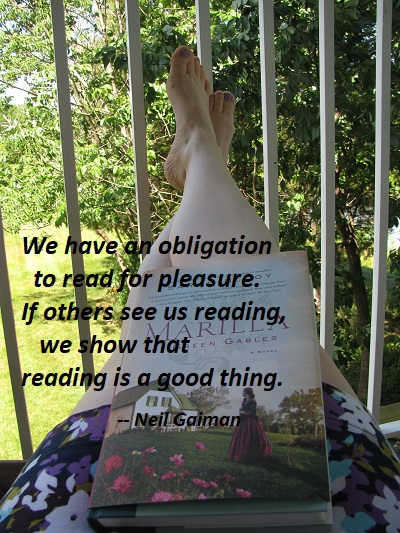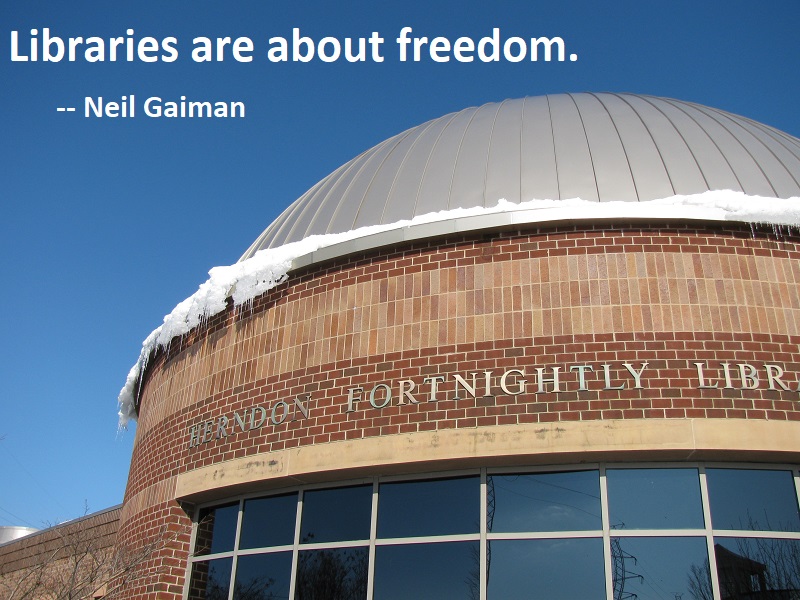Places of Enchantment
Libraries are a bit like forests; they are enchanted places to get lost in.
— Oliver Jeffers and Sam Winston, The Dictionary Story
Photo: Forest in snow, South Riding, Virginia, January 7, 2025
Libraries are a bit like forests; they are enchanted places to get lost in.
— Oliver Jeffers and Sam Winston, The Dictionary Story
Photo: Forest in snow, South Riding, Virginia, January 7, 2025

We have an obligation to read for pleasure. If others see us reading, we show that reading is a good thing.
We have an obligation to support libraries, to protest the closure of libraries.
If you do not value libraries you are silencing the voices of the past and you are damaging the future.
— Neil Gaiman, Art Matters, “Why Our Future Depends on Libraries, Reading and Daydreaming”
Libraries are about freedom.

Freedom to read, freedom of ideas, freedom of communication.
They are about education, about entertainment, about making safe spaces and about access to information.
— Neil Gaiman, Art Matters, “Why Our Future Depends on Libraries, Reading and Daydreaming”
Photo: Herndon Fortnightly Library, Herndon, Virginia, February 12, 2010
The library is genius in its usefulness. It can be a different place for each person who walks in. Your library can help you find a job, go vegan, read up on the new medication you’ve been prescribed, or learn a new language. Your librarian can listen to your knock-knock jokes or provide a safe space and helpful resources if there is violence in your home. She or he can give you directions to your aunt’s house, or tell you if a celebrity is alive or dead, or help you figure out how to give your kid “the talk.” All while keeping your ass swimming in books. And movies. And music. And Internet access.
There is no other place where you can go and basically say, “I need help with this area of my life” and someone will respond, “All right, let’s figure this out.” Maybe your mom, but she’s not as good at “going online” as we are. So, please, go discover all the boundless glory awaiting you. And introduce yourself. Otherwise, you’re going to get a nickname based on whatever weird face you make or the thing you watched on YouTube that you didn’t think anyone noticed.
— Annie Spence, Dear Fahrenheit 451, p. 240-241.
The Library is a good gig to have — convincing people that I want to help them with literally WHATEVER they want to learn about. Helping create more “examiners, critics, knowers.” But it’s harder than it might seem to get people to listen.
Maybe it would be easier if we were allowed to yell? The public librarian has been typecast. We’re supposed to whisper and shush, demand silence, when in reality we work our asses off trying to help people speak up. Maybe it seems safer for us to whisper. Because maybe if we could shout, it would shake the walls down.
— Annie Spence, Dear Fahrenheit 451, p. 86.
Visiting the library with young children is one of life’s great joys, because nothing compares to the experience of picking a book up, holding it, looking at it, seeing the colors, smelling it, and, if you’re really small, chewing the edge of it. One of the glories of books is how many of your senses you use to experience them, including smell and the delight of discovering books by serendipity. You simply don’t have that with ebooks. I have hundreds of titles on my Kindle, but I am very unlikely to go browsing on my Kindle for something to read. That’s the magic of libraries, that possibility of discovering something you didn’t even know you were looking for.
— Neil Gaiman, quoted in This Is What a Librarian Looks Like, by Kyle Cassidy, p. 15
“Thank you,” said Lirael. She fought back the tears in her eyes, because though she no longer felt she was one of the Clayr, she still felt she was a librarian and always would be, no matter what else she had become as well.
— Garth Nix, Goldenhand, p. 170
Places like the public library where Jennifer, Kaitlin, , and Cole found refuge are crucial to the day-to-day survival strategies of the $2-a-day poor. They offer a warm place to sit, a clean and safe bathroom, and a way to get online to complete a job application. They provide free educational programs for kids. Perhaps most important, they can help struggling families feel they are part of society instead of cast aside by it. Sometimes these institutions serve those in need begrudgingly — a library might prefer that it not be a rest stop and warming station for the city’s homeless people. But other times they attend to destitute patrons with tremendous love and warmth. Kaitlin’s friend the librarian gave her more than a job; she gave her a way to contribute, a place to belong.
— Kathryn J. Edin & H. Luke Shaefer, $2.00 a Day: Living on Almost Nothing in America, p. 101
When a library is open, no matter its size or shape, democracy is open, too.
— Bill Moyers, Foreword, The Public Library, by Robert Dawson
Librarians must be on the forefront with community and early childhood agencies to make reading and literacy an essential and pleasing experience embedded within each family’s daily lifestyle by providing guidance, encouragement, enthusiasm, and inspiration — in other words, by taking on the role of a coach in regular family reading initiatives.
— Rita Soltan, Solving the Reading Riddle, p. 68